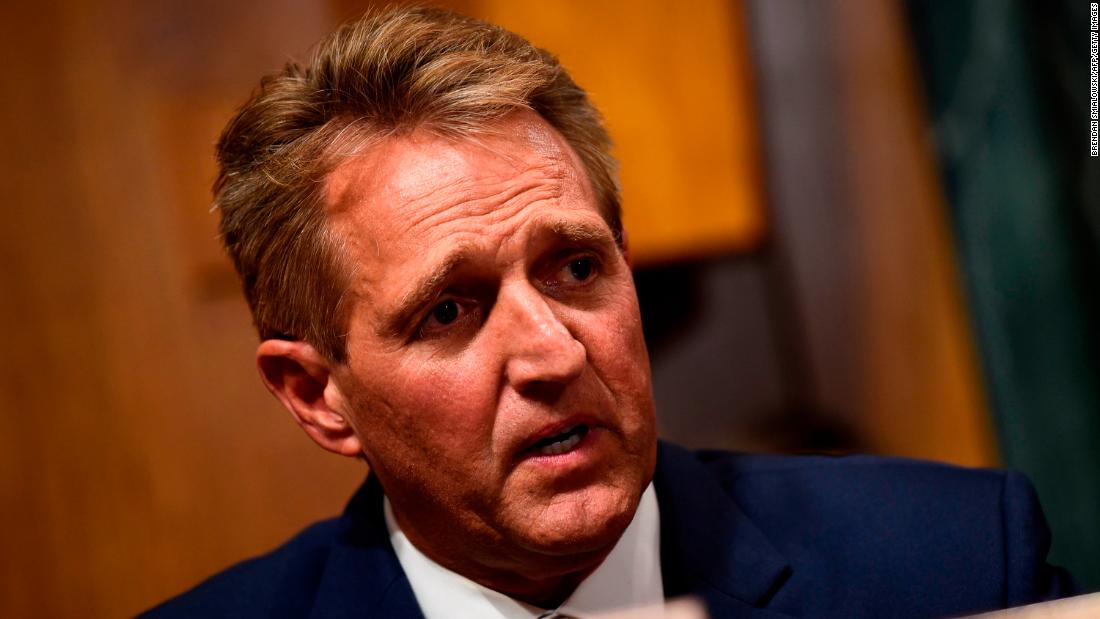[ad_1]
And that change of heart changed everything — albeit temporarily.
1. Flake voted for Kavanaugh to move out of the committee. But he also made clear that he would not vote for Kavanaugh on the Senate floor without an FBI investigation of the sexual assault allegation against him — an accusation that the nominee has vehemently denied.
2. In a vacuum, that doesn’t mean much. If Republicans only lost Flake, they would have 50 votes in favor of Kavanaugh’s confirmation when the scheduled vote would happen on Tuesday. That would allow Vice President Mike Pence to break the tie, and Kavanaugh would be confirmed.
3. But Flake — as well as Minnesota Democratic Sen. Amy Klobuchar — suggested in the moments before the 11-10 vote that there were other Republicans who felt the same as Flake. As in, they would not support Kavanaugh’s confirmation unless and until the FBI investigation happens. Those senators are, presumably, Susan Collins of Maine and Lisa Murkowski of Alaska.
4. None of what Flake did was binding — until the White House and Senate Majority Leader Mitch McConnell weighed in. McConnell formally requested the White House to instruct the FBI to do supplemental background check, which “would be limited to current credible allegations against the nominee and must be completed no later than one week from today.”
The Senate Judiciary Committee announcement means that McConnell, as expected, has bowed to the fact that he does not currently have the votes. Presumably, Flake would not have a) made the one-week FBI investigation request and then b) voted for Kavanaugh to move favorably out of committee unless c) he knew that he had Murkowski and/or Collins (or some other Republican) was with him. (Murkowski confirmed to reporters after the session that she supports Flake’s proposal.)
President Donald Trump bowed to the inevitable on Friday afternoon, ordering an FBI investigation.
So that’s where we are.
With Flake and Murkowski now on the record saying they will not support Kavanaugh unless there is an FBI investigation, McConnell’s hands were effectively tied. He’s not going to call the bluff of Murkowski and Flake for fear that they make good on their promise and Kavanaugh’s nomination fails by a single vote.
Earlier this week, the President publicly expressed his unhappiness with the fact that the vote on Kavanaugh hadn’t happened yet.
“They could have pushed it through two weeks ago and we wouldn’t be talking about this right now, which is what I would have preferred,” Trump told reporters of the Kavanaugh confirmation vote.
Trump, like McConnell, may not have had much of a choice in the matter. If the options are a) refuse to ask the FBI to reopen the background investigation and lose Kavanaugh or b) allow the FBI investigation and, assuming nothing is found that incriminates Kavanaugh, get Flake and Murkowski (and any other wayward Republican senators) back into the fold in support of the judge, then Trump really had only one option.
The biggest loose end still remaining, of course, is whether Kavanaugh decides — in the face of a week-long delay — to simply withdraw. He was adamant that he would not do so during his testimony on Thursday. But he also was very clear that he believed the vote needed to happen immediately. Does this likely delay change anything for Kavanaugh?
And what about Trump? The President is hugely mercurial. He has already openly discussed what would happen if he was forced to move on from Kavanaugh. Does this forced delay make him throw up his hands and simply move on to another nominee that would be less problematic?
More questions than answers. But what’s clear is that now that Flake and Murkowski are holding strong, McConnell and Trump had very few appealing options other than to accept a week-long delay — something they insisted was a non-starter just days ago.
[ad_2]
Source link

